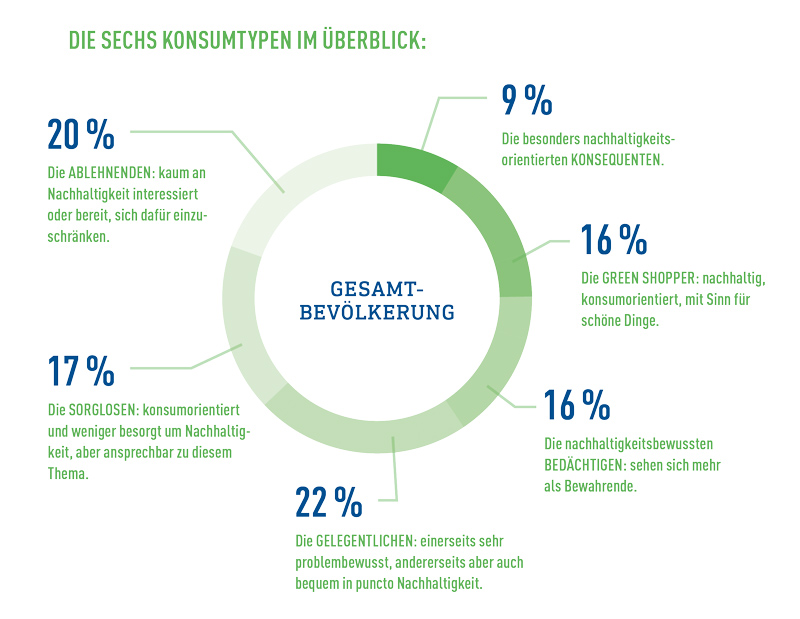For the third time since 2017 and 2020, Utopia Lab has published its study on attitudes, expectations and wishes with regard to sustainability, consumerism and lifestyle. For the first time, the survey was conducted of the 10,000 utopia.de users as well as a representative sample of the German population
with results pointing to the fact that sustainability is now anchored firmly in the mainstream. Of the six defined types of consumer, three are deemed to be particularly sustainability-minded and these make up 41 per cent of the population or close to 30 million people.

*The graphic is only available in German. Here is the translation.
The six consumption types at a glance.
20 percent
The rejects. Hardly interested in sustainability or willing to limit themselves for it.
17 percent
The carefree. Consumer-oriented and less concerned about sustainability, but responsive to the issue.
22 percent
The Occasional. On the one hand very concerned about the problem, but on the other hand comfortable about sustainability.
16 percent
The sustainability-conscious thoughtful. See themselves more as preservationists.
16 percent
The green shoppers. Sustainable, consumer-oriented. With a sense for beautiful things.
9 percent
The particularly sustainability-oriented consequentialists.
Nine per cent of the population are spearheading sustainable consumerism in Germany- These are The Dedicated They set great store in sustainability, are very well-informed and also discerning. They knowingly consume very little and are very particularly about what they are buying, tending to choose products produced in accordance with high social and ecological conditions.
16 per cent are Green Shoppers, who are not quite as committed to the cause as they like shopping, particularly for nice things that are produced as sustainably as possible. Another 16 per cent are The Mindful and 22 per cent The Casual, taking the total of survey respondents who don’t fall into “The Carefree” or “The Dismissive” camps up to 63 per cent and thus a representative majority of the German population.
Awareness of the issue is even more widely spread with 80 per cent believing that climate change is threatening German way of life. 62 per cent stated that they don’t buy certain products on the basis of ecological and ethical concerns, but who is actually prepared to make of an effort and pay more for environmentally friendly and fairly produced products? Unfortunately, most people struggle to do so, and there is quite a gap between words and actions
on the basis of ecological and ethical concerns.
Are smartphones going green?
Generally speaking, consumers are thinking more about sustainability in every aspect of their lives. Survey respondents expect sustainable products and offers especially when it comes to food, personal hygiene and cosmetics, energy and household items. Interestingly, demand for sustainable products is growing the fastest in areas where they haven’t really played such a big role, i.e.banking and insurance, electronics incl. smartphones, and travel.
Experience has shown that consumer trends eventually percolate into the business world and this is particularly the case when it comes to digital technology. This is the definition of consumerisation and a good example of this can been seen in the world of mobile working. Smartphones introduced the possibility of everywhere internet connectivity and being available at all times and this is now a matter of course. The passage of time has increased expectations and these extend to the workplace now, too. Businesses have taken their time to fulfil requirements, especially of data protection of information security, but this is now all in place and it’s possible to work from anywhere.
Can the findings of the Utopia Study on personal consumption be applied to the world of work? We asked Arthur Schneider, Head of Sustainability Management at Bechtle. He sees some parallels, particularly when it comes to the types of consumer in IT procurement. The Dedicated are the public-sector customers who include sustainability criteria in their RfPs as they Are politically obliged to do. Large enterprises also have ambitious goals, not least when it comes to ensuring their supply chains comply with statutory requirements. One example is the automotive industry with its multiple suppliers and its increasing digitalisation. Company size plays an important role as the smaller the company, the more likely they are to be Carefree, but even these are starting to feel the pressure to act.
Businesses are realising that sustainability is growing in importance for both customers and employees alike no matter if in IT or other industries.
Arthur Schneider, Head of Sustainability Management, Bechtle AG
From seals to integrated sustainability.
The need for advice is great and customers are on the look out for partners to share ideas with. “Not a day passes by without one of the Bechtle system houses receiving some kind of enquiry,” says Arthur Schneider. It’s also a great way of winning over new customers.
In much the same way that some groceries have organic seals, there are also various hardware labels that disclose energy efficiency (e.g. Energy Star) or manufacturing standards (e.g. TCO Certified) and these have become a mainstay in the Bechtle shop, but manufacturers aren’t stopping there. One example is the modular and easily repairable Fairphone, also sold by Bechtle, although not in the same quantities of smartphones made by market leaders. Major brands such as Dell and HP are pursuing similar concepts for notebooks in order to make product development fundamentally more sustainable. It’s a win-win as manufacturers save resources and costs and the environment is spared electrical waste.
The result? The world of IT is following a path towards greater sustainability. Going back to the idea of consumerisation with respect to Utopia’s survey results, it’s people and their very personal attitudes and behaviours that jump-start movements. Organisations and institutions need time to adapt to these developments, but regulations such as the Supply Chain Act can act as an accelerator. Above all, it is customers and employees looking for specific products in the workplace and selecting employers based on their sustainability credentials, something which business are increasingly realising.

